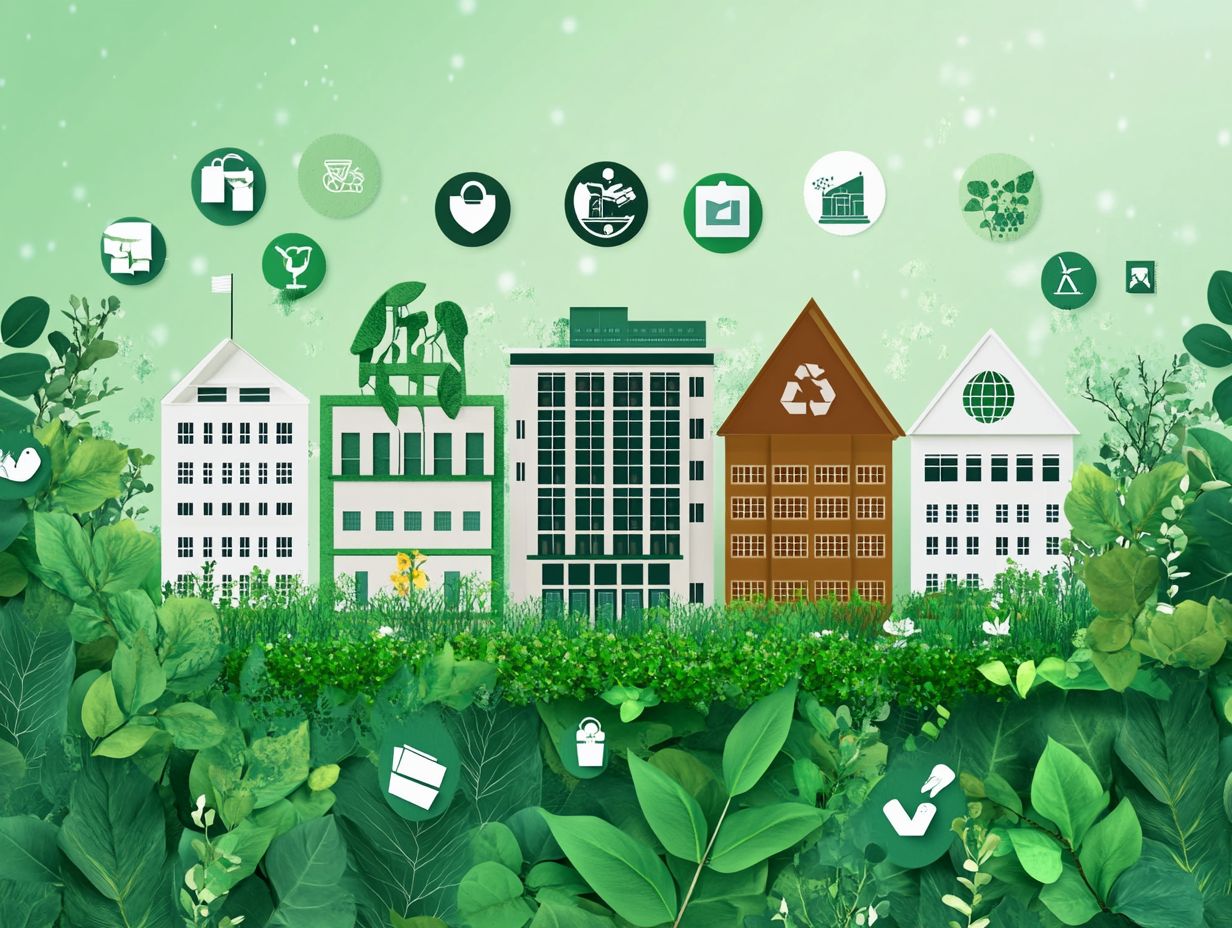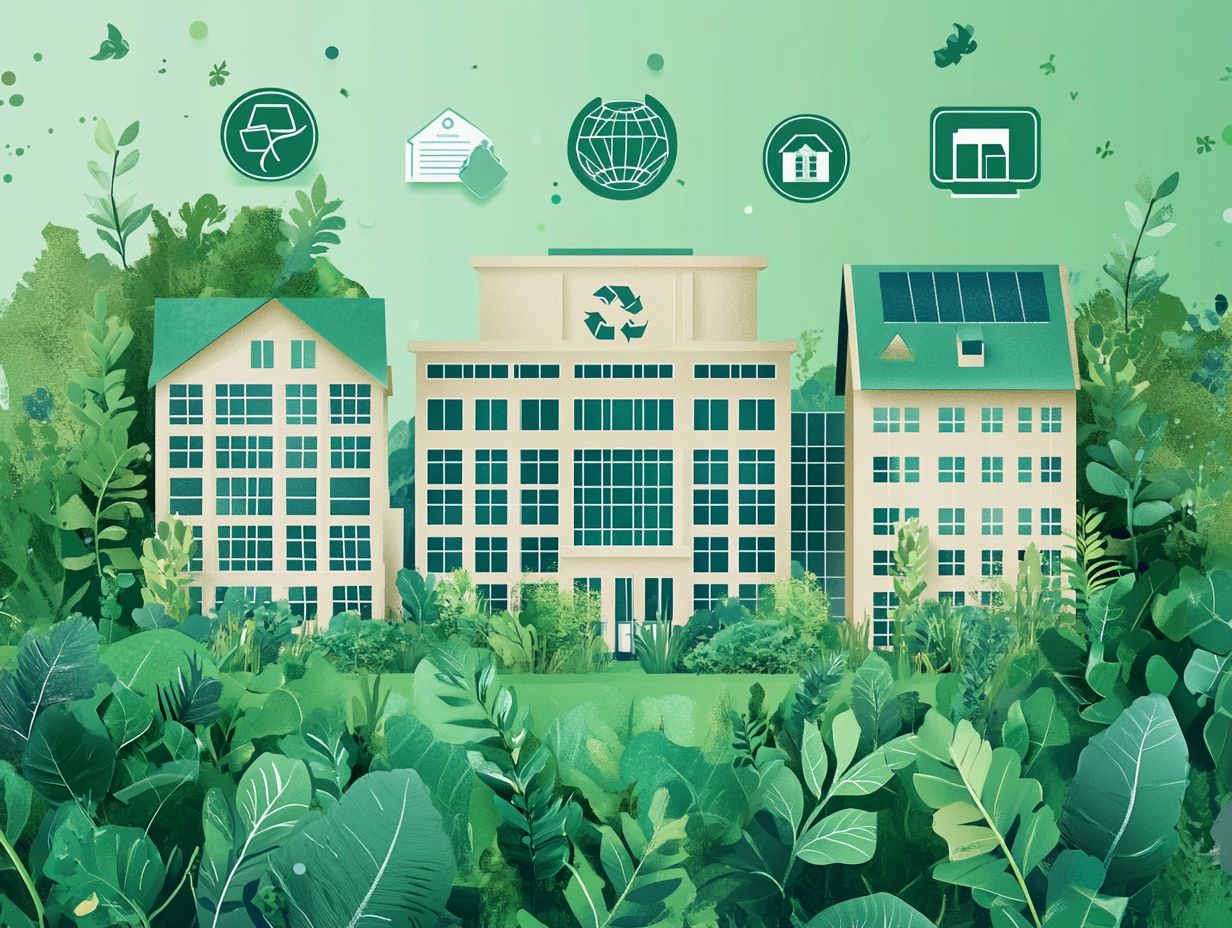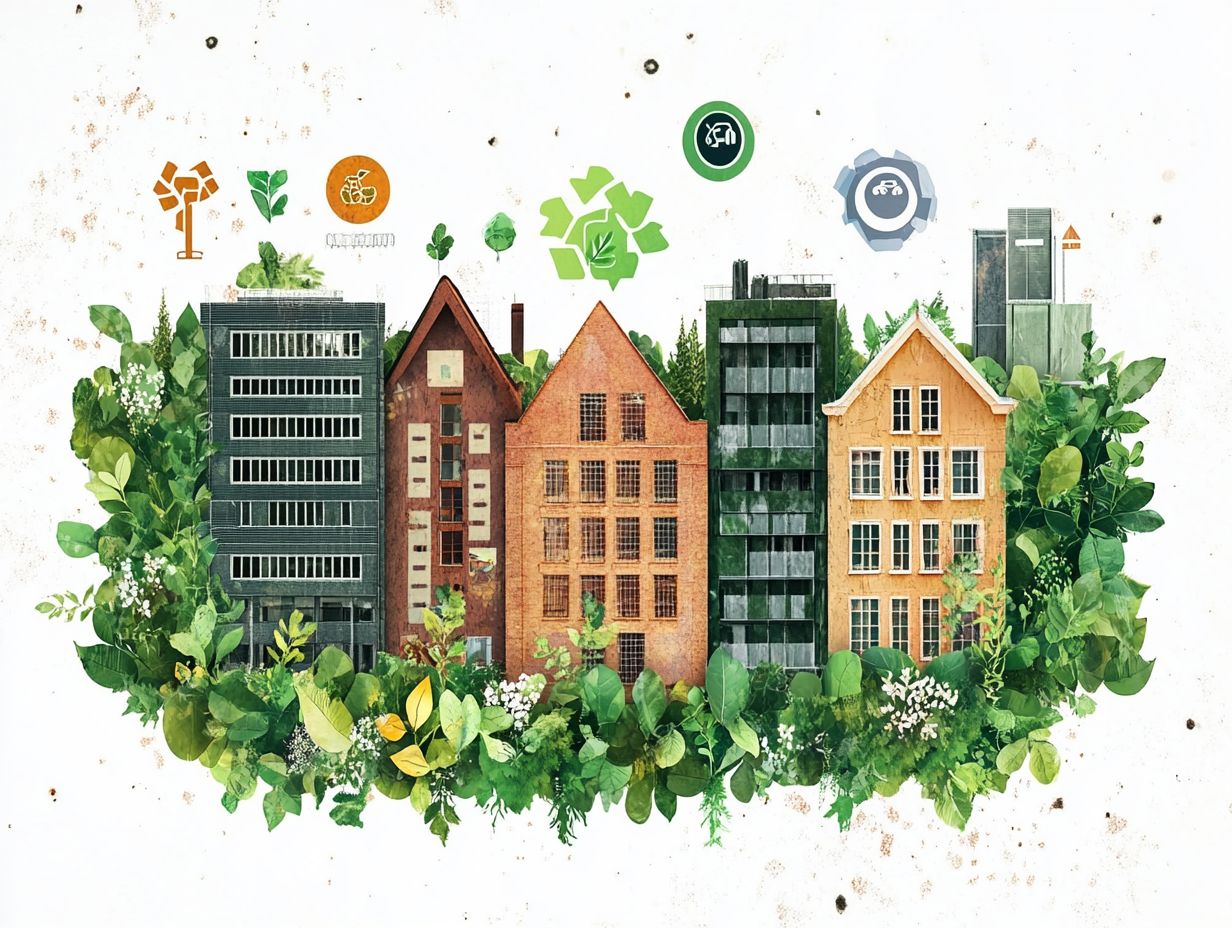As businesses globally place a growing emphasis on sustainability, aspiring leaders are compelled to pursue MBA programs that equip them with skills and knowledge for this critical challenge.
This article showcases the top five MBA programs specializing in sustainability for 2024, providing insights into their educational significance and the innovative content they encompass.
From the focus of the curriculum to the resulting career opportunities, readers will uncover how these institutions are influencing the future of business education, particularly in sustainable management practices.
Whether one is contemplating their options or merely intrigued, this guide serves as a valuable resource for navigating the evolving landscape of sustainable business practices and environmental strategies.
Key Takeaways:

- Sustainability is a crucial aspect of modern business education, and students are increasingly seeking MBA programs that offer a focus on sustainability and environmental impact.
- The top MBA programs specializing in sustainability for 2024 are highly accredited, have well-designed curriculums, and offer promising career outcomes, providing students with impactful skills for the market.
- When choosing the right program, students should consider program fit, costs, and financial aid. Core courses and specializations in sustainability are key features of an MBA program in this field.
Why Sustainability Matters in MBA Programs
In 2023, the focus on sustainable leadership and innovative strategies has become pivotal in MBA education.
Sustainability holds significant importance in MBA programs as it equips future leaders with the essential skills and insights necessary to address pressing global challenges, including climate change and resource depletion. By integrating sustainability into business education, these programs not only prepare students for a rapidly evolving market but also instill a sense of corporate responsibility that stakeholders increasingly demand.
By emphasizing environmental and social impact, MBA programs can nurture innovative thinkers poised to implement sustainable practices within their organizations, thereby driving positive change in their communities and industries.
The incorporation of sustainability into the curriculum encourages future executives to align corporate strategies with societal expectations, ensuring long-term viability and relevance. For instance, companies such as Unilever, Patagonia, and MIT Sloan School of Management have adeptly embraced sustainable practices, yielding enhanced brand loyalty and a distinct competitive advantage in the marketplace.
As corporate responsibility emerges as a pivotal criterion for consumers, aspiring leaders must not only grasp the concept of sustainability but also leverage it as a strategic asset. This holistic approach ultimately equips them to navigate complex challenges and promote a more sustainable economy for future generations while driving community-focused solutions.
Criteria for Ranking Sustainability MBA Programs
In the pursuit of identifying the premier sustainability MBA programs, a multitude of criteria must be considered, each reflecting the educational quality and dedication to sustainable practices. Accreditation status stands as a hallmark, ensuring that the program adheres to rigorous academic standards. Additionally, the curriculum’s comprehensive exploration of sustainability topics plays a pivotal role in assessing its depth and relevance.
Career outcomes are equally critical, serving as indicators of how effectively graduates transition into environmentally focused roles or ascend to leadership positions within sustainable organizations. Moreover, access to essential resources, opportunities for experiential learning, and the program’s overarching reputation significantly influence the ranking of these esteemed programs.
Accreditation and Recognition
Accreditation serves as a critical benchmark for evaluating the quality and credibility of sustainability-focused MBA programs, ensuring that institutions uphold rigorous academic standards. Esteemed bodies such as AACSB and AMBA meticulously assess programs based on various factors, including curriculum design, faculty qualifications, and student outcomes. This prestigious recognition not only bolsters the program’s reputation but also assures students that they are receiving a quality education tailored to the evolving demands of the global market for sustainability experts, particularly in innovative practices.
For prospective students contemplating enrollment, the presence of accreditation often emerges as a decisive factor in their choice of institution. Accreditation signifies adherence to established educational criteria and reflects a steadfast commitment to continuous improvement in teaching and learning practices. It instills confidence among students, assuring them that they are being equipped to confront real-world environmental challenges under the guidance of knowledgeable practitioners in the field.
Programs that hold accreditation frequently benefit from superior job placement rates and robust industry connections, rendering their graduates highly sought after by employers eager to integrate sustainability into their business models and operations for greater economic impact.
Curriculum and Career Outcomes
The curriculum of sustainability MBA programs is pivotal in shaping the skills and knowledge of aspiring business leaders, seamlessly integrating core courses that address both the theoretical and practical dimensions of sustainability. By emphasizing innovative strategies, experiential learning, and leadership practices, these programs prepare students for impactful careers in sustainable business practices. Career outcomes are frequently associated with the program’s effectiveness in equipping graduates with the necessary tools to excel in roles that prioritize environmental and social responsibility, utilizing advanced technology and methods.
Key components of these curricula generally include courses such as:
- sustainable finance
- corporate social responsibility
- supply chain management
These subjects not only impart critical insights into ethical decision-making and resource efficiency but also enhance analytical skills pertinent to addressing contemporary business challenges, fostering a global perspective.
Many programs also emphasize hands-on projects and partnerships with businesses committed to sustainability, providing participants with invaluable real-world experience. Engaging in these transformative learning environments positions students advantageously for entry into sectors centered on green innovation, enabling them to make meaningful contributions to their organizations and society at large.
Top 5 MBA Programs Specializing in Sustainability
As sustainability emerges as a pivotal theme in business education, certain MBA programs distinguish themselves through their remarkable emphasis on environmental impact and sustainable leadership, ranking among the best schools worldwide.
The ensuing list showcases the top five MBA programs globally, celebrated for their dedication to weaving sustainability into their curricula. These institutions, including EADA Business School and York University, offer innovative strategies to address climate challenges while equipping students for prosperous careers in sustainable management.
Beyond imparting fundamental business principles, these programs underscore the significance of social responsibility and ethical practices, fostering a new generation of conscientious leaders.
1. [Program Name]
![1. [Program Name]](https://ombest.xyz/wp-content/uploads/2024/09/the-top-5-mba-programs-specializing-in-sustainability-for-2024-go.jpeg)
The [Program Name] is celebrated for its comprehensive sustainability curriculum, which emphasizes leadership and innovative solutions to environmental challenges within the business landscape.
This distinguished program is meticulously crafted to equip students with the essential skills needed to adeptly navigate the complexities of sustainable management. It offers a diverse array of courses, ranging from green supply chain management to renewable energy policies, all delivered by esteemed faculty members with extensive industry expertise.
The curriculum not only cultivates critical thinking but also promotes experiential learning through real-world projects. The program boasts impressive career placement statistics, with a substantial percentage of graduates securing positions in leading organizations that champion sustainability practices and strategies.
Through collaborative engagements with industry leaders, students are primed to drive impactful change in their future careers.
2. [Program Name]
The program offers an exceptional emphasis on environmental impact, equipping students with the crucial skills needed to navigate the intricacies of sustainable business practices.
Through a meticulously crafted curriculum, learners explore essential topics such as corporate social responsibility, sustainable supply chain management, and ecological economics. The program prioritizes experiential learning, enabling participants to engage in real-world projects, internships, and workshops that seamlessly connect theory with practice.
Collaborations with industry leaders, non-profit organizations, and governmental agencies further enrich the educational journey, providing invaluable networking opportunities and insights from seasoned professionals in the field. This comprehensive approach ensures that graduates emerge not only well-informed but also armed with practical experience to address today’s pressing environmental challenges.
3. [Program Name]
[Program Name] is renowned for its unwavering commitment to corporate responsibility, equipping students with innovative strategies to implement sustainable practices across diverse business sectors. Notably, institutions like the University of British Columbia and Maastricht University contribute significantly to this field.
The learning environment cultivates critical thinking and collaboration, urging future leaders to confront real-world challenges through hands-on projects and community partnerships.
Notable alumni from the program have thrived in various industries, applying sustainability principles that have yielded significant environmental and social impacts. Alumni from programs like EADA Business School and University of Victoria have made notable contributions.
Graduates frequently discover opportunities to influence corporate policies, drive sustainable innovations, and engage in initiatives that promote ecological balance, as seen in programs at the University of Winchester and York University.
This harmonious blend of theoretical knowledge and practical application give the power tos students to make substantial contributions to the ongoing shift toward more responsible and sustainable business practices, reflecting the values of institutions like the University of Guelph and La Trobe Business School.
4. [Program Name]
[Program Name] distinguishes itself through its strong focus on global impact, preparing students to spearhead sustainable initiatives that catalyze change within their communities and beyond. Programs in Europe, including ESMT Berlin and Warwick Business School, are leaders in this regard.
By cultivating strategic global partnerships with esteemed organizations and institutions, this program not only enriches its research opportunities but also equips participants with the vital tools necessary for effective problem-solving. As exemplified by research initiatives at MIT Sloan School of Management and UC Berkeley Haas School of Business.
Through collaborative projects and innovative research, the initiative plays a pivotal role in tackling urgent sustainability challenges at both local and global levels.
Students engage with thought leaders and experts, acquiring insights that shape impactful policies and practices. Their contributions foster a broader dialogue on sustainability, underscoring the significance of grassroots movements, a commitment shared by institutions like Duquesne University and University of Vermont.
in building resilient communities while aligning closely with the United Nations’ Sustainable Development Goals.
5. [Program Name]
[Program Name] places a strong emphasis on community engagement, instilling a profound sense of responsibility in students as they strive to develop practical solutions for real-world sustainability challenges. The University of Victoria and Colorado State University excel in addressing these complex issues.
Through a variety of outreach initiatives, the program fosters collaboration with local organizations, allowing participants to immerse themselves in meaningful projects that directly address urgent environmental issues. By partnering with community members, students refine their teamwork, a methodology embraced by Toronto Metropolitan University and the University of Exeter.
and leadership skills while gaining invaluable insights into the complexities of sustainable practices. This hands-on experience cultivates not only their confidence but also equips them with the ability to analyze and creatively respond to challenges.
Such collaborative efforts magnify the ripple effect of change, positively influencing not only individual growth but also shaping the broader community’s approach to sustainability. This collaborative approach is embodied by institutions like the University of Winchester and Centrum PUCP.
Choosing the Right Program for You
Selecting the appropriate MBA program with a focus on sustainability, such as those offered by the University of British Columbia and York University, represents
a pivotal choice that can profoundly influence an individual’s career path and personal development. Institutions like EADA Business School and La Trobe Business School emphasize these aspects. With a multitude of options at their disposal, prospective students must diligently assess a range of factors, including curriculum, faculty, and experiential learning opportunities, in order to identify a program that resonates with their professional ambitions and core values, which are epitomized by programs at Maastricht University and Griffith Business School.
Grasping
the alignment between personal aspirations and the program’s offerings is vital for making a well-informed decision. Furthermore, taking into account financial aid options and the associated costs of these programs is essential to ensure both accessibility and affordability.
Evaluating Program Fit

Evaluating program fit stands as a crucial element in the selection of an MBA program, guiding prospective students to discern whether the curriculum resonates with their personal and professional aspirations in sustainability. Key factors to consider include the comprehensiveness of sustainability topics addressed, the teaching methodologies utilized, and the overarching culture of the program—each of which can profoundly impact the learning experience and the skills cultivated.
A well-aligned program not only fosters student engagement but also equips individuals to thrive in their future careers by harnessing their education to tackle pressing sustainability challenges.
As individuals delve into these aspects, they should scrutinize how the program weaves in critical themes such as climate change, renewable energy, and corporate social responsibility, a focus shared by Warwick Business School and York University.
within its core curriculum. Teaching approaches that emphasize experiential learning, like case studies and collaborative projects, can significantly enrich students’ comprehension of practical sustainability applications in the business realm.
Furthermore, the program’s cultural framework—encompassing its values, commitment to diversity, and community engagement—plays an imperative role in shaping students’ perspectives and nurturing collaborative efforts.
Together, these elements cultivate an environment ripe for innovative thinking, ultimately preparing graduates to emerge as leaders in sustainable practices.
Understanding Costs and Financial Aid
Understanding the costs associated with MBA programs and the available financial aid options is crucial for prospective students seeking a degree in sustainability. Tuition fees, living expenses, and other ancillary costs can accumulate rapidly, underscoring the importance of seeking financial aid, scholarships, and grants to ease the financial burden. By thoroughly exploring these avenues, students can make well-informed decisions about their education and engage fully in their programs without the weight of excessive financial stress.
Many institutions offering an MBA in sustainability acknowledge the increasing demand for eco-conscious professionals and have crafted various financial resources to support candidates. The average tuition can be substantial, often ranging from $30,000 to $80,000 for the entire program, influenced by the school’s prestige and location.
Students should also anticipate living expenses, which may fluctuate depending on whether they choose to live on-campus or off-campus. To mitigate these expenses, prospective students can explore options such as:
- Federal student loans
- Private loans
- Work-study programs
- Specific scholarships targeted at individuals committed to environmental stewardship and sustainable practices
By leveraging these resources thoughtfully, students can significantly alleviate the financial strain associated with their educational journey.
What to Expect from an MBA in Sustainability
Pursuing an MBA in sustainability entails distinct expectations concerning the curriculum, core courses, and available specializations designed to equip students for careers centered on environmental impact and corporate responsibility.
Students can expect a robust curriculum that seamlessly integrates sustainable practices across multiple business disciplines, including management, finance, and operations. Furthermore, many programs present specializations that enable students to explore specific areas of sustainability in greater depth, such as renewable energy, sustainable supply chain management, and corporate social responsibility.
Core Courses and Specializations
Core courses within an MBA program specializing in sustainability are meticulously crafted to offer a robust foundation in sustainable business practices and environmental management. These courses address critical topics such as sustainable operations, corporate social responsibility, and environmental policy, ensuring that students acquire the essential knowledge and skills to lead with a focus on sustainability.
Furthermore, students have the opportunity to select specializations that resonate with their interests, such as sustainable entrepreneurship or green finance, thus curating a personalized educational experience.
By synthesizing theories from diverse disciplines, these programs prepare students to address the intricate challenges that contemporary businesses face. For instance, a course in sustainable operations illustrates how to optimize supply chains to reduce waste, while those centered on corporate social responsibility foster a mindset conducive to ethical decision-making. Specializations like sustainable entrepreneurship inspire innovative thinking, give the power toing students to craft business models that prioritize environmentally friendly solutions.
Every facet of the curriculum underscores the significance of sustainability, equipping graduates not only to thrive in their careers but also to instigate meaningful change within the corporate landscape.
Future Trends in Sustainability Education
The emerging trends in sustainability education, as seen in programs at the University of Guelph and Canada, indicate
a transformative shift in how MBA programs are addressing environmental issues and corporate responsibility. With heightened awareness surrounding climate change and societal challenges, educational institutions are increasingly embracing innovative teaching methods, interdisciplinary curricula, and strategic partnerships with businesses to enrich the learning experience.
This evolution not only fortifies the educational foundation for students across various universities, like the University of Guelph and Griffith Business School, but also positions them as leaders capable of effecting significant global change through sustainable practices.
To facilitate this transformation, numerous programs, including those at the University of Victoria and York University, are incorporating experiential learning opportunities that allow students to engage directly with real-world sustainability challenges. By collaborating with local communities and businesses, these initiatives promote hands-on involvement and foster critical thinking.
Furthermore, the integration of advanced technologies—such as data analytics and simulation tools—into the curriculum at institutions like EADA Business School and La Trobe Business School equips future leaders with essential skills to navigate the complexities of the sustainability landscape. Consequently, graduates are better prepared to advocate for sustainable strategies that serve both business interests and the health of the planet, aligning educational outcomes with the urgent needs of society.
Also Read : Funding Your MBA in Sustainability: Scholarships and Financial Aid Options
Frequently Asked Questions
What are the top 5 MBA programs specializing in sustainability for 2024?

The top 5 MBA programs specializing in sustainability for 2024 are currently projected to be the University of Cambridge, Harvard Business School, University of Oxford, INSEAD, and Yale School of Management. Additional notable programs include the MIT Sloan School of Management and UC Berkeley Haas School of Business.
The top 5 MBA programs specializing in sustainability for 2024 are currently projected to be the University of Cambridge, Harvard Business School, University of Oxford, INSEAD, and Yale School of Management.
How were these top 5 MBA programs chosen?
These top 5 MBA programs were chosen based on their focus on sustainability and environmental impact, as well as their reputation and rankings among other MBA programs globally.
What makes these MBA programs stand out in terms of sustainability?
These MBA programs, including those at ESMT Berlin and Maastricht University, have dedicated tracks or concentrations specifically focused on sustainability, covering topics such as corporate social responsibility, sustainable business practices, and environmental policy.
These MBA programs have dedicated tracks or concentrations specifically focused on sustainability, covering topics such as corporate social responsibility, sustainable business practices, and environmental policy.
What career opportunities are available for graduates of these MBA programs?
Graduates of these MBA programs, such as those from the University of Vermont and Colorado State University, can pursue careers in a variety of industries, including environmental consulting, sustainable business development, renewable energy, and sustainability consulting.
Graduates of these MBA programs can pursue careers in a variety of industries, including environmental consulting, sustainable business development, renewable energy, and sustainability consulting.
Can these MBA programs be completed in 2024 or are they projected to launch in that year?
These MBA programs are projected to be available in 2024, but some of them, like those at the University of British Columbia and Toronto Metropolitan University, may already be accepting applications and enrolling students for that year.
These MBA programs are projected to be available in 2024, but some of them may already be accepting applications and enrolling students for that year.
Are there any specific requirements for applicants to these MBA programs?
Each MBA program, including those at Warwick Business School and Durham University, may have its own set of requirements, but in general, applicants are expected to have a strong academic background, relevant work experience, and a demonstrated interest in sustainability and environmental impact. Some programs may also require GMAT or GRE scores.
Each MBA program may have its own set of requirements, but in general, applicants are expected to have a strong academic background, relevant work experience, and a demonstrated interest in sustainability and environmental impact. Some programs may also require GMAT or GRE scores.
